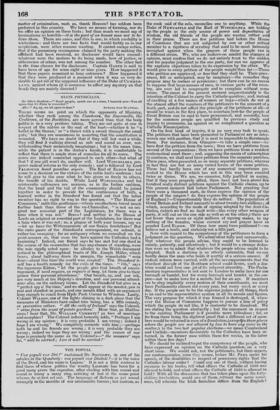STATE PHYSICIANS.
Sir Meer Surface.—" Good people, speak one at a time, I beseech you—You all agree that Sir Peter is wounded!"
i/11.—" Ay, ay, we all agree in that." SCHOOL FOR SCANDAL.
THERE seems no point on which the opponents of Ministry, whether they rank among the Candour*, the Sneerwells, the Crabtrees, or the Backbites, are more agreed than that the body politic is in a very perilous taking. They are not quite at one in respect of the nature or the seat of the hurt—whether it be " a bullet in the thorax," or " a thrust with a sword through the small guts," but they are unanimous in asserting that the constitution is wounded. We have no doubt that if they will but wait a while, they will find it walking abroad as safe and sound as ever, not- withstanding their melancholy imaginings ; but in the mean time, while the patient is in the doctors hands, it is comfortable to reflect that there is ample store of remedies for all its sores. The cures are indeed somewhat opposed to each other—but what of that ? if one pill won't do, another will. Lord WINCHILSEA pro- poses radical reform as the only remedy; and is followed by Lord FALMOUTH haud passibus cequis. The Earl of ELDON has not come to a decision on the virtues of the noble lord's nostrum ; but he will give to the case what he has given so freely to others, the benefit of his doubts. While Lord WINCHILSEA and his aristocratic colleagues are anxious, as in the Indian emblem, that the head and the tail of the community should be joined together in order to provide for the continuance of both, a learned writer in the Standard has found out that the latter member has no right to wag in the question. " The House of Commons," saith this gentleman—whose recollections travel much further back than those of the ex-Chancellor, " is not an ori- ginal nor essential part of the Legislature, for there was a time when it was not." Bravo ! and neither is the House of Lords an original or essential part of the Legislature, for there.was a time when it was not; so, a plague of both your houses, say we —let us have the Wittenagemote of our Saxon forefathers ! But the ratio quare of the Standard's correspondent, we submit, is rather too sweeping; for an antiquary whom we consulted on the point assures us, that even the laws against the Catholics had a beginning! Indeed, our friend says he has met but one deed in the course of his researches that has any chance of standing, were the rule rigidly acted upon : he alludes to the Welsh document noticed in the philosophical tracts of Mr. Joseph Miller, which hears, about half-way down its margin, the remarkable " nota bene—about this time the world was created." The Standard it- self has a fourth remedy for the evils of the times. " Oh," says the ingenious Editor, " let the peeple give that breath of encou- ragement, if need require, as require it may, let them give to their prince their personal attendance." Our breath, ay, and our ink, are very much at his Majesty's devotion, and our personal attend- ance also, on the ordinary terms. Let the Standard but give us a "perfect spy o' the time," and we shall appear at the muster, pen in rest and standish in pouch, and our mouth filled with an argument long enough to reach from Hyde Park Corner to Windsor. Lastly, Colonel WILSON, one of the lights shining in a dark place that the measures of Ministers have called into being, has a fifth remedy, or preventive rather. " All the evils of Ireland" says the Colonel, " arise from the want of potato gardens." Hear that, ye Malthu- sians ! hear that, Mr. WILLIAM COBBETT ! ye foes of marriage and murphies ! The Colonel indeed honestly adds, " Perhaps I am wrong in my opinion ; it is very probable I am wrong ; indeed I hope I am wrong." We completely coincide with him ;—perhaps both he and his friends are wrong ; it is very probable they are wrong ; indeed we hope they are wrong : and the reason of our hope is precisely the same as the Colonel's—" the measure" says he, " will be carried ; I see it will be carried !"
















 Previous page
Previous page